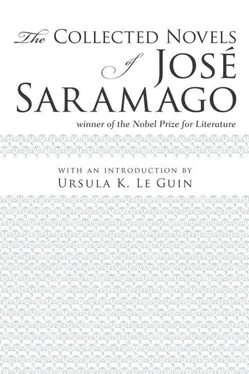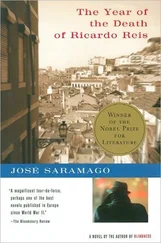Almost as mighty as God is the replica of the Basilica of St Peter in Rome that the King is building. It is a construction without a base or foundation, resting on a table-top, which does not need to be very solid to take the weight of a model in miniature of the original basilica, the pieces lying scattered, waiting to be inserted by the old method of tongue and groove, and they are handled with the utmost reverence by the four footmen on duty. The chest in which they are stored gives off an odour of incense, and the red velvet cloths in which they are separately wrapped, so that the faces of the statues do not scratch against the capitals of the columns, reflect the light cast by the huge candelabras. The building is almost ready. All the walls have been hinged together, and the columns have been firmly slotted into place under the cornice with the name and title of Paolo V Borghese inscribed in Latin which the King no longer reads, although it always gives him enormous pleasure to observe that the ordinal number after the Pope’s name corresponds to the V that comes after his own. In a king, modesty would be a sign of weakness. He starts to place the effigies of prophets and saints into the appropriate grooves on top of the walls and the footman gives a low bow as he removes each statue from its precious velvet wrappings. One by one, he hands the King a statue of some prophet lying face down, or of some saint turned the wrong way around, but no one heeds this unintentional irreverence as the King proceeds to restore the order and solemnity that befits sacred objects and turning them upright, he inserts each vigilant statue into its rightful position. What the statues see from their lofty setting is not St Peter’s Square but the King of Portugal and his retinue of footmen. They see the floor of the dais and the screens looking on to the Royal Chapel, and tomorrow at early Mass, unless they have already been wrapped up and put back in the chest, the statues will see the King devoutly attend the Holy Sacrifice of the Mass with his entourage, different nobles from those who are with him at present, for the week is ending and others are due to take their place. Beneath the dais where we are standing, there is a second dais, also hidden by screens, but there are no pieces here waiting to be assembled, it is an oratory or a chapel where the Queen attends Mass privately, yet not even this holy place has been conducive to pregnancy. Now all that remains to be set in position is the dome by Michelangelo, a copy of that remarkable achievement in stone which, becauses of its massive proportions, is kept in a separate chest and, as the final, and crowning piece, is treated with special care. The footmen make haste to assist the King and, with a resounding clatter, the tenons and mortises are fitted together and the job is finished. If the overwhelming noise that echoes throughout the chapel should penetrate the long corridors and spacious apartments of the palace into the chamber where the Queen is waiting, she will know that her husband is on his way.
Let her wait. The King is still preparing himself before retiring for the night. His footmen have helped him to undress and have garbed him in the appropriate ceremonial robes, each garment passing from hand to hand with as much reverence as if they were the relics of holy virgins, and this ceremony is enacted in the presence of other servants and pages, one opens the huge chest, another draws back the curtains, one raises the candle, while another trims the wick, two footmen stand to attention, and two more follow suit, while several others hover in the background with no apparent duties to fulfil. At long last, thanks to their combined labours, the King is ready, one of the nobles in attendance straightens a last fold, another adjusts the embroidered nightshirt, and any moment now, Dom João V will be heading for the Queen’s bedchamber. The vessel is waiting to be filled.
Now Dom Nuno da Cunha, the bishop who heads the Inquisition makes his entrance accompanied by an elderly Franciscan friar. Before he approaches the King to deliver his news, there is an elaborate ritual to be observed with reverences and salutations, pauses and retreats, the established protocol when approaching the monarch, and these formalities we shall treat as having been duly observed, given the urgency of the bishop’s visit and the nervous tremors of the elderly friar. Dom João V and the Inquisitor withdraw to one side, and the latter explains, The friar who stands before you is Friar Antony of St Joseph, to whom I have confided Your Majesty’s distress at the Queen’s inability to bear you children. I begged of him that he should intercede on Your Majesty’s behalf, so that God may grant you succession, and he replied that Your Majesty will have children if he so wishes, and then I asked him what he meant by these obscure words, since it is well known that Your Majesty wishes to have children, and he replied in plain words that if Your Majesty promises to build a convent in the town of Mafra, God will grant you an heir, and after delivering this message, Dom Nuno fell silent and bade the friar approach.
The King inquired, Is what His Eminence the bishop has just told me true, that if I promise to build a convent in Mafra I shall have heirs to succeed me and the friar replied, It is true, Your Majesty, but only if the convent is entrusted to the Franciscan Order and the King asked him, How do you know these things and Friar Antony replied, I know, although I cannot explain how I came to know, for I am only the instrument through which the truth is spoken, Your Majesty need only respond with faith, Build the convent and you will soon have offspring, should you refuse, it will be up to God to decide. The King dismissed the friar with a gesture and then asked Dom Nuno da Cunha, Is this friar a man of virtue, whereupon the bishop replied, There is no man more virtuous in the Franciscan Order. Reassured that the pledge requested of him was worthy, Dom João, the fifth monarch by that name, raised his voice so that all present might hear him speak, and so that what he had to say would be reported throughout the city and the realm the following day, I promise, by my royal word, that I shall build a Franciscan convent in the town of Mafra if the Queen gives me an heir within a year from this day, and everyone present rejoined, May God heed Your Majesty, although no one knew who or what was to be put to the test, Almighty God Himself, the virtue of Friar Antony, the King’s potency, or the Queen’s questionable fertility.
Meanwhile, Dona Maria Ana is conversing with her Portuguese chief lady-in-waiting, the Marchioness de Unhão. They have already discussed the religious devotions of the day, their visit to the convent of the discalced Carmelites of the Immaculate Conception at Cardais, and the novena of St Francis Xavier, which is due to start tomorrow in the parish of St Roch, the conversation one might expect between a queen and a woman of noble birth, exclamatory and at the same time fearful, as they invoke the names of saints and martyrs, their tones becoming poignant whenever the conversation touches on the trials and sufferings of holy men and women, even if these simply consisted in mortifying the flesh by means of fasting and wearing hairshirts. The King’s imminent arrival, however, has been announced, and he comes with burning zeal, eager and excited at the thought of this mystical union of his carnal duty and the pledge he has just made to Almighty God through the mediation and good offices of Friar Antony of St Joseph. The King enters the Queen’s bedroom accompanied by two footmen, who start to remove his outer garments, the Marchioness, assisted by a lady-in-waiting of equal rank who came with the Queen from Austria, doing the same for the Queen, passing each garment to another noblewoman, the participants in this ritual make quite a gathering, their Royal Highnesses bow solemnly to each other, the formalities seem interminable, until finally the footmen depart through one door and the ladies-in-waiting through another where they will wait in separate anterooms until the act is over and they are summoned to escort the King back to his apartments which were occupied by the Dowager Queen when the King’s late father was still alive, and the ladies-in-waiting come to settle Dona Maria Ana under the eiderdown that she also brought from Austria, for she cannot sleep without it, be it summer or winter. This eiderdown is so suffocating, even during the chilly nights of February, that Dom Joáo V finds it impossible to spend the entire night with the Queen, although it was different during the first months of marriage, when the novelty outweighed the considerable discomfort of waking to find himself bathed in perspiration, his own as well as that of the Queen, who slept with the covers pulled over her head, her body accumulating odours and secretions. Accustomed to a northern climate, Dona Maria Ana cannot bear the torrid heat of Lisbon. She covers herself from head to foot with the huge, overstuffed eiderdown, and there she remains, curled up like a mole that has found a boulder in its path and is trying to decide on which side it should continue to burrow its tunnel.
Читать дальше












